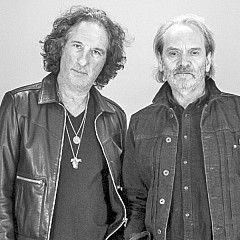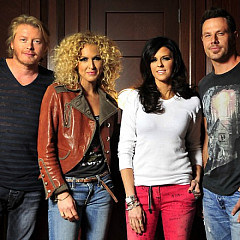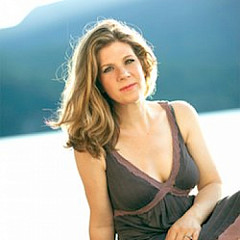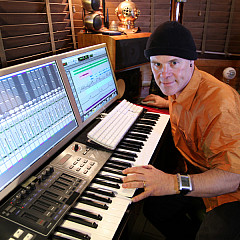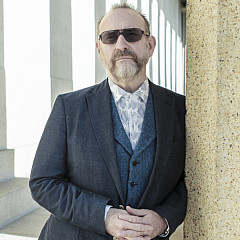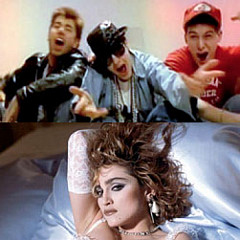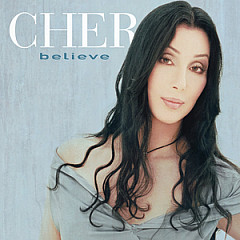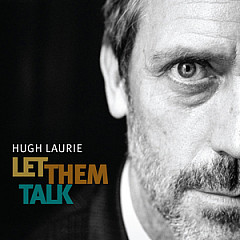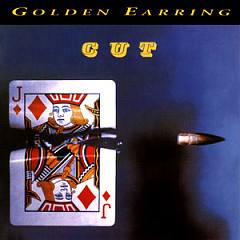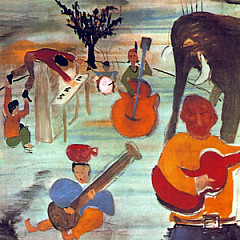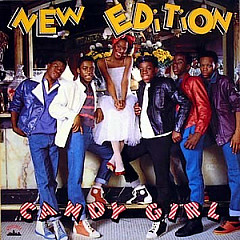 "Southern Nights"
"Southern Nights" Artist: Glen Campbell
Writer: Allen Toussaint
Album: Southern Nights
Label: Capitol
Year: 1977
Chart Position: #1 US, #28 UK
 Even though Glen Campbell took "Southern Nights" to #1 in 1977, the song didn't have any discernible impact on the already established career of its writer, New Orleans legend Allen Toussaint. "It was just one of the songs that was out during that time," he said. "I was busy doing many things and having a good time. We were kicking with the Meters and things like that. Lee Dorsey was still around and I was writing for him a lot. Shortly thereafter came Patti Labelle doing 'Lady Marmalade,' which I produced. I had a partner, Marshall Sehorn, who was drumming up business and answering the questions on whether we would produce an artist for a company and I was just back there making music and writing songs and producing and arranging."
Even though Glen Campbell took "Southern Nights" to #1 in 1977, the song didn't have any discernible impact on the already established career of its writer, New Orleans legend Allen Toussaint. "It was just one of the songs that was out during that time," he said. "I was busy doing many things and having a good time. We were kicking with the Meters and things like that. Lee Dorsey was still around and I was writing for him a lot. Shortly thereafter came Patti Labelle doing 'Lady Marmalade,' which I produced. I had a partner, Marshall Sehorn, who was drumming up business and answering the questions on whether we would produce an artist for a company and I was just back there making music and writing songs and producing and arranging."According to Toussaint, there wasn't even much of an uptick on his regular BMI checks at the time. "I didn't notice anything special from that song, because the checks come with payments from the tiniest song to the most major. I didn't notice it, because I never was paying attention to the amount of the check. Never."
But Toussaint does have a theory as to why the song wasn't as life-changing as one might assume. "It took people quite a while to realize I'd written it," he said. "I wasn't out there performing, so I guess some people thought probably Glen Campbell had written it. Which I don't mind. It was just like all the rest of the songs I've written in my life. People didn't know I wrote 'Mother-In-Law' or 'Java' or 'Working in the Coal Mine' either."
As opposed to "Southern Nights," Toussaint regarded "Mother-In-Law," the #1 tune he penned for the great New Orleans showman Ernie K-Doe, as more of a commercial effort. "I understood that it was the kind of a song with a tempo and a message that anyone would understand and either like or dislike. But again, even at that time I never paid attention to its success or failure, because I was always onto the next thing, like I still am these days."
The story goes that "Mother-In-Law" was rescued from the trash by one of Ernie K-Doe's backup singers. Allen doesn't dispute the legend. "What happened is I wrote four songs for him to do, because we always recorded four songs at a time, and 'Mother-In-Law' was one of them. When I tried it out on him the first time, he began to shout and preach at it and I really didn't like his approach to it. I thought it was a waste of time to try to get him to do it, so I balled it up and put it in the trash can, like I did with other songs. One of the backup singers, Willie Harper, thought it was just a wonderful song, so he took it out of the trash can and said, 'K-Doe, why don't you calm down and listen closer to the way Allen is doing it and try to do it like that? This is a good song.' So he calmed down and didn't preach at it, but did it like it finally came out. Ernie was a cocky individual, but I thought he was a dear man and he loved the business so much. I think he thought that James Brown had his slot, and he was going after it. He liked James Brown's energy and he really wanted to let the world know there's an Ernie K-Doe."
These days Toussaint remains one of the finest emissaries of the New Orleans tradition he has helped to create. "I'm glad to say it's a wonderful day for us," he said. "We're still turning out good people, like Trombone Shorty, John Boutté, and people like that. And those youngsters are still blowing their horns in front of St. Louis Cathedral and down on Jackson Square right now. It's a wonderful music scene, I'm so glad to say. They're holding onto some tradition, as well as growing into the future. They're taking a tradition with them."
While I was finishing the album Van Dyke Parks visited me in the studio. He was a wonderful guy, a genius of a guy. He said, "Well, consider that you were going to die in two weeks. If you knew that, what would you think you would like to have done?" And after he said that, I wrote "Southern Nights" as soon as he left. I stood right there and wrote it. It all came at once, because I lived that story. It was one of those things that writers would like to happen all the time. We would like to write from total sheer spiritual inspiration, but many times we just write from our tools and our bible. That song was a total inspiration. It felt like a soft clear white flower settled above my head and caressed me. I really felt highly, highly inspired and very spiritual doing that song. It's the only one I felt that much about. Some others have been inspired highly, but not as high as that one.
It probably took about two hours to write. Then I went down and recorded it in the studio with just a Fender Rhodes and another guy beating on an ashtray, that little tinkling sound. It was just me on the instrument and singing, and Tony Owens playing on an ashtray. No one remarked on it, because it didn't sound much like a commercial song, and it wasn't. I didn't write it to be a song like all the others on there. I just wanted to share that story with this album. It wasn't supposed to be a commercial song, and I didn't think it would sound like one to anyone else. But I did feel quite complete after I wrote "Southern Nights." I felt totally finished with the album. But that didn't mean I was ready to die!
The album had a very good reception. In fact, Warner Brothers sponsored a marvelous tour and I was able to take a full complement of musicians and singers on the road. I went out on the road with Lowell George and Little Feat. That was quite a charge, because he was just so hip and I admired him and his work so very much. He also liked what I was doing a lot. He was a wonderful guy and very savvy and wide awake. I performed the song on the road because it was part of the record. I didn't talk about it like I started doing much later on. Now when I do "Southern Nights," many times I tell the story of it. I didn't tell the story in those early days. I did a shorter version, because I didn't think people would have the patience to sit through a story, because it was just so personal to me. But I knew it wasn't a mainstream tempo beat, so I didn't impose that on people. Sometimes I didn't play it at all, or I may have played just a little bit of the ending of it or something like that. I just knew it wasn't a mainstream song and I always assumed that people would rather hear something that moves.
I never watched it on the charts. I was so busy doing other things and by the time I heard it, it was a hit. I met Glen Campbell afterwards many times. We would meet and chat like friends. I guess after that song he began to pay attention to me more as a writer, knowing that I had written it. He knew other songs of mine, and he liked them.
I was just so surprised that "Southern Nights" would become a mainstream hit. It's most interesting. These days, when I introduce it, I put it in another light, 40 years later. In those days, when someone would hear my version, they'd hear some words and maybe not hear some others, and they'd be waiting for the next thing to happen. But now, after I tell the story, I think everyone hears it in a better light and understands the significance of it.
January 29, 2014
Photo: Glade Bilby II
More They're Playing My Song

